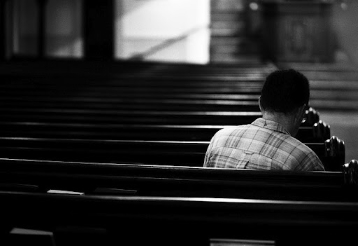
Lie: Prayer is useless, a waste of time.
Truth: Prayer will eventually fill all of our time.
I have been driven many times to my knees by the overwhelming conviction that I had absolutely no other place to go. — Abraham Lincoln
I hear this lie – prayer is useless – whispered in my ear as a convenient excuse to avoid God when I’m not willing to deal with the bigger lies like: God doesn’t exist; God doesn’t care, or I don’t need God. I’m also tempted to believe this lie when I’m not dealing with the sin in my life: hypocrisy if I do pray, condemnation if I don’t (more on the reasons we fall for this lie later). The real tragedy is that so many Christians never experience the simplicity and purity of prayer, never get close enough to the place where prayer becomes the source of life. Too many experience prayer only as drudgery, a ritual, a superficial list, or a sudden crisis. But prayer is so much more.
Prayer may seem useless if answers don’t seem to be forthcoming. But instead of dismissing prayer wholesale, we need to ask rather, like the disciples: ‘Lord, teach us to pray.’
For Christians, prayer[1] is our life’s blood; it’s our connection with God that we experience as praise, as worship, as meditation, conversation, supplication, intercession and even travail. And when we faithfully exercise this great privilege, eventually life becomes a continuous conversation with the living God, and in some ways, you could say that prayer becomes our life. By prayer we process everything that comes into our lives.
It became obvious to the disciples how important prayer was to Jesus:
Now it came to pass, as He was praying in a certain place, when He ceased, that one of His disciples said to Him, ‘Lord, teach us to pray, as John also taught his disciples.’
So He said to them, ‘When you pray, say:
Our Father in heaven,
Hallowed be Your name.
Your kingdom come,
Your will be done
On earth as it is in heaven.
Give us day by day our daily bread.
And forgive us our sins,
For we also forgive everyone who is indebted to us.
And do not lead us into temptation,
But deliver us from the evil one.’ — Luke 11:1–4
Once truly absorbed, this model prayer forms the foundation and orientation of our lives as Christians. Though it can be prayed verbatim, its power is seen in the necessity and meaning of each of its ten phrases, and even in each word of each phrase.
Let’s just take the first phrase and break it down.
Our Father in heaven
This phrase sets the stage and context for the rest of the prayer. Word-by-word:
Our — We pray in concert with others. Even if we pray alone as Jesus did, we know that do not pray alone, but stand on the shoulders of the saints who’ve gone before us; we are strengthened by the faithful prayers of others in the present. Few have the strength or motivation to faithfully pray unless properly connected to others.
Father — In prayer, we come to know God as our Father, which makes us his child. All of the aspects of good family apply: love, tenderness, correction, discipline, instruction, inheritance and more.
In Heaven or in the heavens — These words are important in locating our Father: he dwells in ‘the heavens;’ the Greek is plural though it’s not translated as such. The ancients believed in the plurality of the heavens: the first heaven – the atmosphere, which is literally the air around us that we breathe; the second heaven is the firmament: the blue sky and the starry night; the third heaven is the throne of God. Thus, Paul claimed to have been caught up to the ‘third heaven’ and heard unspeakable things. See 2 Corinthians 12:2.
It’s important to locate God correctly because, if he only inhabits the third and is absent from the first or second, consequently he is removed from us. But the truth is we cannot escape his Presence, even if we tried (Psalm 139:5–7).
Rightly understanding, believing and practicing the Lord’s Prayer sets a foundation not just for prayer, but for life. And in the course of praying this prayer, God transforms us as we develop a deep relationship with him, who, more than any other, desires to see us grow up as his sons and daughters.
But why would we believe that prayer is useless anyway? Let’s look at four reasons:
1 We don’t believe or feel that God unconditionally accepts us.
Before anything else, we must see the fundamental truth that God truly accepts us, but not begrudgingly or passively, but eagerly – he is truly for us. We must see that, despite our sins and apparent unworthiness, he believes we actually are worthy (see the lie: I can become more worthy of God’s love). He, as a good father, cherishes and loves his children.
The revelation of the grace of God is a spiritual awakening; we must see it for ourselves; we must see that he personally accepts and loves us. At the point we realize this (though we will need this revelation refreshed throughout our lives), prayer ceases to be ‘useless,’ as if the purpose of prayer were simply to be ‘used.’ When this revelation occurs, prayer also takes on a whole new meaning and becomes our joy and life-line to our heavenly Father.
2 We don’t feel safe with God – he’s too scary.
This cause is directly related to number one above: not feeling or believing accepted by God. It may be simply another way of saying the same thing. But make no mistake, in the proper way we should fear God, because he is ‘a consuming fire’ (Heb 12:29). We must never imagine that God is somehow manageable or less powerful or sovereign. But the reason we can and should feel safe with him is due to the sacrifice of Jesus Christ. His sacrificial death appeased the righteous wrath of God directed toward humanity. The concept of appeasement is the idea behind the old word propitiation. Both Apostles John and Paul used it in the same way: Christ is our propitiation.
My little children, these things I write to you, so that you may not sin. And if anyone sins, we have an Advocate with the Father, Jesus Christ the righteous. And He Himself is the propitiation for our sins, and not for ours only but also for the whole world. — I John 2:1–2
and Paul to the Romans:
But now the righteousness of God apart from the law is revealed, being witnessed by the Law and the Prophets, even the righteousness of God, through faith in Jesus Christ, to all and on all who believe. For there is no difference; for all have sinned and fall short of the glory of God, being justified freely by His grace through the redemption that is in Christ Jesus, whom God set forth as a propitiation by His blood, through faith, to demonstrate His righteousness, because in His forbearance God had passed over the sins that were previously committed, to demonstrate at the present time His righteousness, that He might be just and the justifier of the one who has faith in Jesus. — Romans 3:21–26
God’s justice and truth require a righteous judgment on man and that was accomplished when he judged Christ as the Representative Man on the cross. But Christ rose from the dead, inaugurating a new humanity, a new creation not subject to his judgment, in which, if we trust him, we find ourselves ‘hidden with Christ in God.’ Christ the risen Man stands as the living propitiation.
If then you were raised with Christ, seek those things which are above, where Christ is, sitting at the right hand of God. Set your mind on things above, not on things on the earth. For you died, and your life is hidden with Christ in God. — Colossians 3:1–3
So we can legitimately feel safe with the heavenly Father just as Christ felt safe with him. He knew he was sent to be ‘the Lamb of God who takes away the sin of the world.’ Our present safety from God’s righteous wrath has nothing to do with us, but everything to do with Christ and his work and his living presence as the risen Man.
3 We wrongly imagine prayer to be primarily utilitarian.
The framing of this lie – prayer is useless – assumes that, for it to be essentially valuable, prayer must be ‘useful,’ that is, useful for our own purposes. But of course, this is not true. Prayer, even if framed as nothing more than a form of communication, is still much more. A simple analogy may help: imagine that your husband talks to you only when he needs something – to make him breakfast, to wash his shirt, pay his bills, etc. In effect, you, his wife, become nothing more than a servant. So in framing prayer as useless, we fall prey to the deadly assumption, although unintentional, that God becomes our servant.
Yes, in prayer we do pray for ‘our daily bread,’ but we also learn to commune, appreciate, inquire, admire, adore and worship. Prayer is a bottomless well of communion with the unfathomable God. Prayer unlocks the twin purposes in life: adoration and glorification. See the lie: the meaning of life is an unfathomable mystery.
4 We assume prayer to be always easy.
At the surface prayer could not be simpler. Our God has made himself super-accessible through Christ our Mediator and through the Spirit. And so we commune with him simply by a thought or a look with our spiritual eye. This simple, sweet and peaceful communion is always available.
But as with any significant relationship, some conversations are harder than others. We tend to avoid the hard questions, the disappointments, our failures and weaknesses. But more than personal issues, God calls us to labor in prayer for others. Jesus did this before calling his disciples, while ministering to the multitudes, before casting out demons, and before drinking his cup of suffering. In the Garden of Gethsemane, Jesus prayed until he ‘sweat great drops of blood,’ the medical condition now known as hematidrosis, which is triggered by intense stress. See Luke 22:44.
The old saints used to speak of ‘praying through,’ which meant praying until they received an answer. Today we have little stamina and see little value in such work, but we are the poorer for it.
Prayer is not useless. Without prayer our life is meaningless; prayerlessness divorces us from the source and meaning of life. But once understood and practiced, prayer fills our days and forms the foundation and context of our lives. It orients us, guides us, shows us what’s important, opens and closes doors, enlightens, empowers and ultimately transforms us. We begin as children to pray at the perfunctory times, but then it grows: we learn to pray as we wash dishes, as we drive, as we converse with our friends and finally into all the spaces of our lives. Slowly it becomes both a never-ceasing conversation and a deep cry.
As we get older and our physical activity decreases, our spiritual activity should consequently increase until, at our death, prayer would be our only activity (2 Cor 4:16–18). This is true whether we are a believer or not, for when our eyes are finally closed in death, our spiritual eyes will be opened as never before. At that point you will either praise him or plead for mercy.
[1] The shorthand use of the word prayer here, as in ‘prayer is our life’s blood,’ may sound as if the practice of prayer itself is the agent of our transformation. But actually it is God himself who is the agent. He uses prayer – our relationship expressed – to transform us and those around us. Using this shorthand gets to the point quicker.
See also the Introduction, Lies attacking our relationship to God.